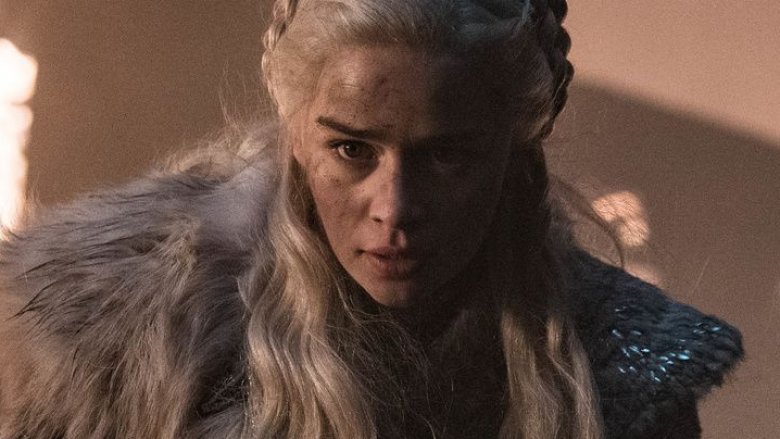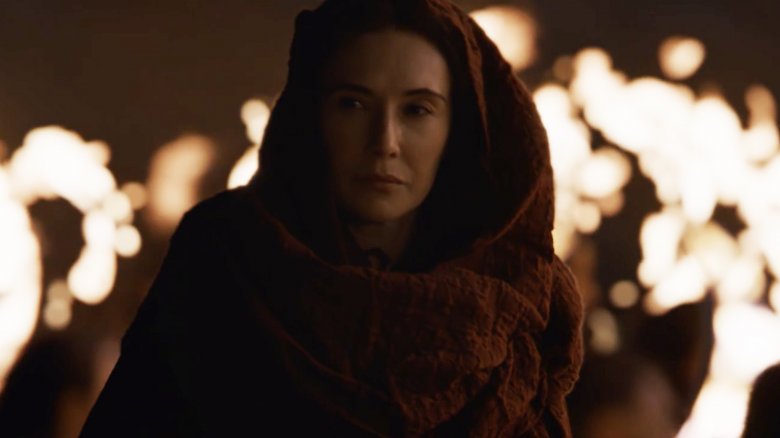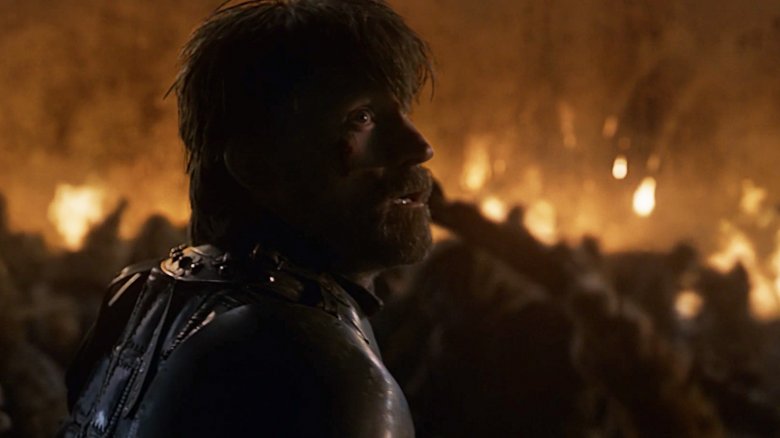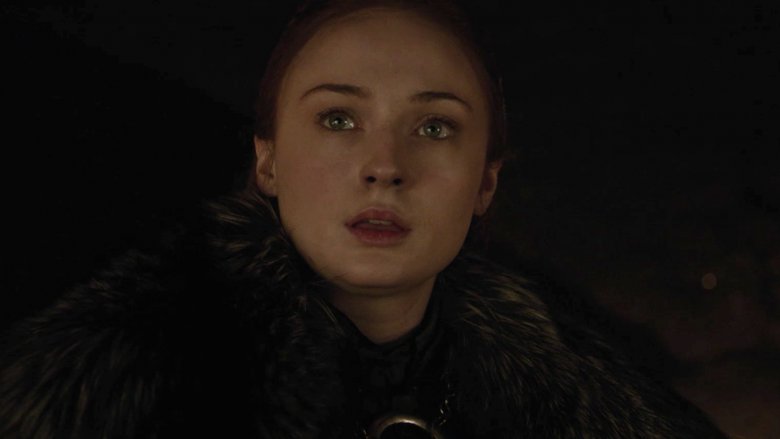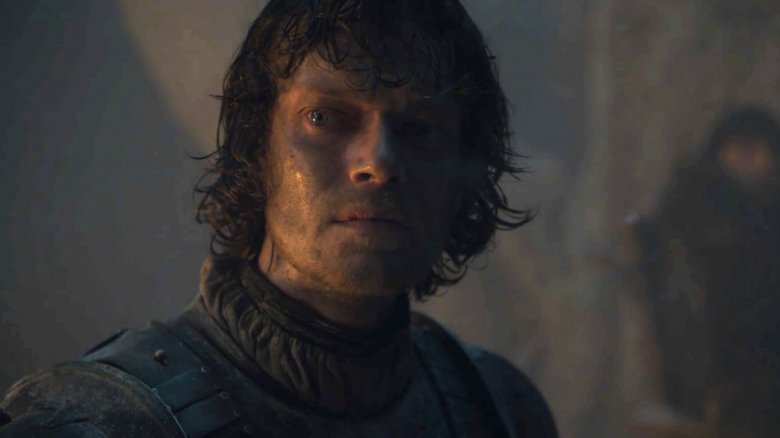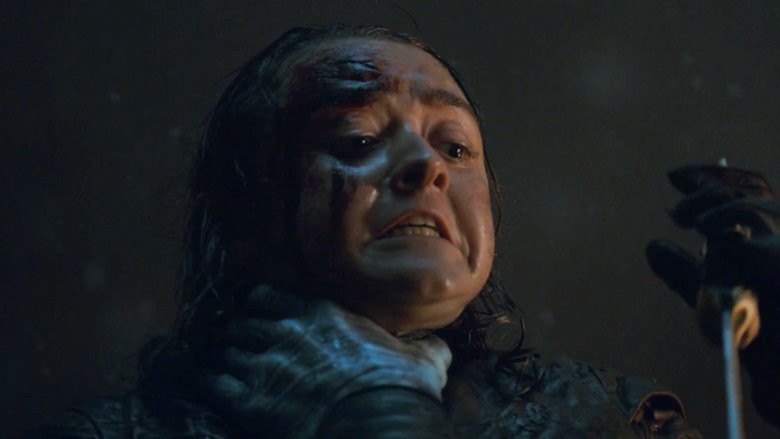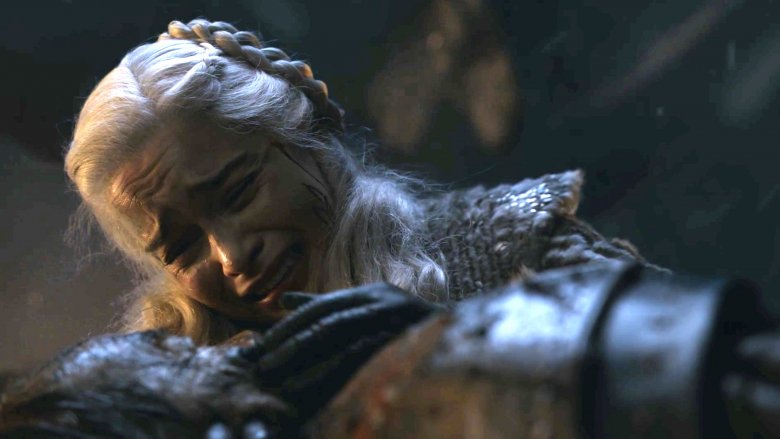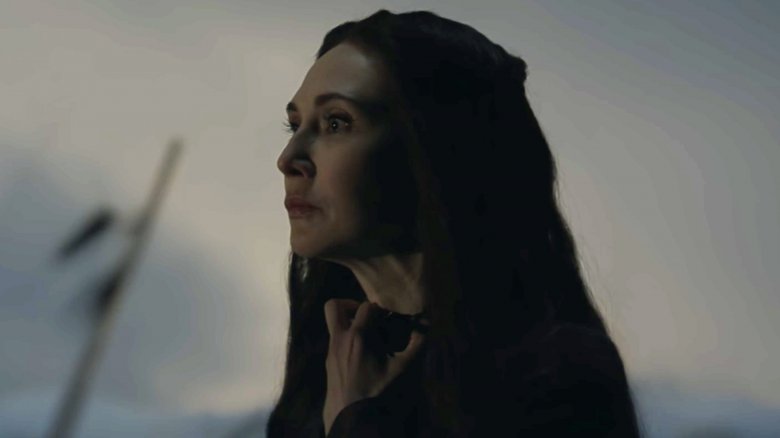Game Of Thrones' Final Season Episode 3 Ending Explained
It's something of a Game of Thrones tradition for the penultimate episode of a season to feature a battle massive in scale and body count. For the eighth and final season of the fantasy epic, however, bets are off and rules are broken: Fans had only two episodes to prepare for the battle longest awaited by fans. We're talking, of course, about the brawl between the Night King and his Army of the Dead and the humans of Westeros — the Battle of Winterfell.
The second episode of Game of Thrones season 8, "A Knight of the Seven Kingdoms," established the foundation for this fight — and the third episode wasted no time diving into the action, coming in hot and holding nothing back. Sure to be remembered as one of the most epic entries in Thrones history, "The Long Night" pit the living against the dead, the light against the dark, and fire against ice in a battle to end all battles. Many characters took their final breaths in the icy Winterfell air, Arya Stark (Maisie Williams) somehow got even more badass than she already was, and the greatest threat to the future of the Seven Kingdoms was finally vanquished.
Let's break down the biggest things that happened on the third episode of Game of Thrones season 8.
Let there be light
The night is dark and full of terrors as the episode sets out. A string of shots showing tenacious but terrified faces make it clear that things are grim as the undead enemy quickly encroaches on Winterfell. But that changes when Melisandre (Carice van Houten) makes her highly anticipated return and brings fire to ice by summoning the Lord of Light to set the Dothraki soldiers' weapons aflame.
Melisandre arming the Dothraki with fiery sickles isn't just for show or to take away Beric Dondarrion's (Richard Dormer) special status as the leader of Blazing Weapons Club — it serves a doubly practical purpose and connects to a famous Game of Thrones legend. With their blades all lit up, the Dothraki can actually see what's ahead, and have a far better chance at killing wights, which can be defeated by fire. Additionally, the Red Priestess gifting them with fire makes the Dothraki look like the legendary warrior Azor Ahai, who used a flaming sword called Lightbringer to bring an end to the first Long Night by slaying White Walkers by the thousands — the very thing they're trying to do here.
Melisandre again works her magic when Jon Snow (Kit Harington) and Daenerys Targaryen (Emilia Clarke) miss a signal from Davos to light a wight-trapping trench, proving that she intends to play a part in the Battle of Winterfell.
A bloodbath from the beginning
The bodies start falling from the first swing of a sword. Even equipped with flaming weapons and steadfast determination, just as Azor Ahai was, the Dothraki aren't men of myths or the enders of the Long Night. Soon after they forge ahead into the darkness, with Jon's direwolf Ghost charging alongside them, the Dothraki outriders are wiped out by the wights, who force their way toward the walls of Winterfell's castle with ferocity. The side of the living quickly becomes overwhelmed by the dead, and the wights come close to killing several characters. Jon and Daenerys send their dragons, Rhaegal and Drogon, out into battle to breathe fire onto the enemy, to little avail. The dead aren't dying, an out-of-this-world windstorm clouds everyone's vision, people are dropping left and right, and the episode's first major death comes when Lord Commander of the Night's Watch Dolorous Edd (Ben Crompton) dies via stabbing when trying to save Samwell. Newly knighted Brienne then orders the forces to retreat into Winterfell's gates, though Grey Worm and the Unsullied stay behind to fight in the open.
This is obviously not how anyone planned for the battle to play out, despite knowing they were up against a supernatural force of size and strength unmatched to any previous opponent. Making the decision to fall back couldn't have been easy for Brienne, whom Jaime made an official Knight of the Seven Kingdom just hours earlier.
The crypt is alive
The speed at which the battle devolves into chaos from the outset also pushes Arya to send her sister Sansa to the crypts, the so-called safest place in Winterfell. In the catacombs, Sansa, carrying a dragonglass dagger Arya told her to stick the enemy "with the pointy end," joins her former husband Tyrion Lannister (Peter Dinklage), Sam's partner Gilly (Hannah Murray), Daenerys' Master of Whispers Varys (Conleth Hill), and Daenerys' personal advisor Missandei (Nathalie Emmanuel) — plus every woman, child, and elderly individual who convened at Winterfell ahead of the fight. Sansa, Tyrion, and Missandei exchange barbs — Sansa tells the crew that they're "useless," Tyrion says that they should have stayed married, Sansa fires back that his loyalty to Dany would cause Big Problems, and Missandei gets defensive in shutting down any Dragon Queen slander — before the situation becomes no laughing matter.
As fans predicted, the corpses resting in the Stark family crypt under Winterfell come back to life and take victims down with zero difficulty or remorse. While dozens die screaming behind them, Sansa, Tyrion, Gilly, Varys, and Missandei make it out of the crypts alive — and their survival may spell trouble moving forward (apart from Gilly's). Tyrion, Varys, and Missandei are on Daenerys' side; they've all bent the knee and pledged loyalty to her. Sansa, on the other hand, hasn't warmed up to her yet... and might never once she realizes that Jon, her brother who is really her uncle, is the true heir to the Iron Throne and not Dany. Had some of Daenerys' team died in the crypts, she would have even less backing on her quest for queenship. Bad for Dany, potentially good for Sansa and the Starks.
Thank you, Theon
Theon Greyjoy (Alfie Allen) has done some serious repenting since betraying House Stark at the start of the War of the Five Kings. Taken in as a ward and a prisoner of Ned Stark (Sean Bean) following his own father's duplicity, Theon grew up in Winterfell and had long been considered a member of the Stark family, particularly a brother to Robb (Richard Madden). Theon's treachery against the Starks reached its apex when he seized Winterfell on the second season of Game of Thrones, capturing two farm boys and displaying their burnt bodies on the castle's walls, passing them off as Bran (Isaac Hempstead Wright) and Rickon Stark (Art Parkinson).
Beneath the Weirwood tree in Winterfell's godswood, where Bran is awaiting the Night King, Theon is absolved of his sins from the one person he's been longing to make amends with: Bran himself. Bran tells him that everything he's done brought him to where he is now: home. The youngest living Stark then offers Theon gratitude, saying "Theon, you're a good man. Thank you" after Theon slays packs of wights approaching the Weirwood.
The Night King then emerges, and Theon attempts to kill him by stabbing him with a spear, but it's no use — the Night King murders Theon with a swift jab. While it's rarely nice to see characters die on Game of Thrones (save for Joffrey and/or Littlefinger), there's a bright side to Theon's death: at least he died with peace in his heart, knowing Sansa, Jon, and finally Bran forgave him.
Arya says 'not today'
Arya Stark and death have maintained an interesting relationship. She evaded the dangerous force yet again on the third episode of Thrones season 8, lengthening the lives of everyone in the Seven Kingdoms by killing the Night King.
In the corridors of Winterfell, Arya sneaks past wights before Beric and the Hound come to her rescue. Beric gives his life for Arya's, dying by multiple stab wounds the wights inflict on him, which Melisandre states was the reason the Lord of Light brought him back from the dead. The Red Priestess then reminds Arya that she will indeed "shut many eyes forever ... brown, green, and blue eyes, too" — a prophecy as to what Arya is about to do next. Just before Arya leaves Melisandre's view, the latter asks, "What do we say to the God of Death?" Arya answers as she always has: "Not today."
Cut to the moment after the Night King sticks a spear through Theon's torso like he's a piece of meat on a kebab skewer, and Arya suddenly appears behind the frosty villain. He attempts to kill her via choking, and her Valyrian steel dagger falls. But Arya catches the weapon, finds a space in the Night King's armor, and stabs him there, causing him, all of his underlings, and Viserion to shatter into a million tiny pieces.
There are two bits of poignancy here. First, the Night King's death came around the same place his "birth" did: in a godswood near a Heart Tree; second, Bran's life was saved using the same dagger that a catspaw implemented during an assassination attempt on him back in season 1. Time is a flat circle, indeed.
Major characters meet their makers
Amidst all the madness of the third episode of Game of Thrones' final season, viewers had to bid farewell to several standout characters. First was Dolorous Edd, later Beric when the wights got all stab-happy on him, then Theon who got hole-punched, and then the Night King, who got what was coming to him. But many more perished fighting in the Battle of Winterfell.
Little Lyanna Mormont (Bella Ramsey), the ferocious lass from Bear Island who insisted she take part in the fight, dies a heroic death when she bravely stabs a wight giant in the eye and is subsequently crushed in its hand. Alys Karstark (Megan Parkinson) falls offscreen, as she was among the people protecting Bran alongside Theon in the godswood.
Then came — brace yourselves — Jorah Mormont (Iain Glen). We'll give you one guess as to how he died. If you guessed "defending his Khaleesi, Daenerys, to the bitter end," you would be 100 percent correct. When a pack of wights unleash fury on Drogon, who takes flight and abandons Dany, the Mother of Dragons is left to fight off enemies herself. That is, until Jorah swoops in and protects her from what end up being fatal hits. Dany sheds many a tear over Jorah, which we're certain he'd be touched to hear in the afterlife.
In terms of the number of major characters who died this episode, the third episode of season 8 pales in comparison to past Thrones installments. However, factor in the thousands of Unsullied and Dothraki, plus the hundreds of Westerosi troops and people in the crypt, and "The Long Night" has a death toll comparable to other Thrones battle episodes.
Melisandre makes a dramatic exit
Game of Thrones season 8, episode 3 saved arguably the most impactful death for last: Melisandre's. As the sun begins to rise and the night slips under the horizon, Melisandre walks out of Winterfell, stepping between two mounds of dead bodies like Moses parting the Red Sea, and willingly ends her life. She removes the red-amulet-adorned necklace that perpetually sat around her throat, continues out into the battlefield, and leaves the mortal coil by disintegrating into nothingness.
On season 6 of Thrones, it was revealed that Melisandre wasn't actually the youthful woman she appeared to be. In actuality, she was incredibly old — withered with grey hair and sagging skin — and the necklace extended her life and kept her looking young. Remove it and leave it off for too long, and she was bound to succumb to the effects of extreme old age.
Melisandre's motivations for giving herself over to death are likely twofold: she felt her work in Winterfell was complete, and she may have been harboring guilt over the death of little Shireen Baratheon, whom she helped burn at the stake in season 5. Whatever the true reason may be, Melisandre kept good on two past promises: she once shared with Varys that she was destined to "die in this strange country," meaning Westeros, and told Ser Davos (Liam Cunningham) at the start of the Battle of Winterfell that she would "be dead before dawn."
